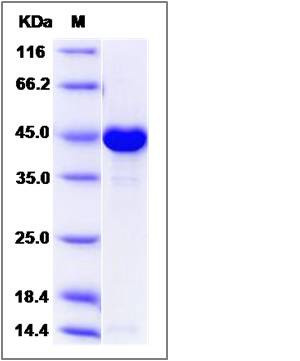Human CKMT1A Protein (His Tag)
CKMT,CKMT1,CKMT1A
- 100ug (NPP2020) Please inquiry
| Catalog Number | P13924-H07B1 |
|---|---|
| Organism Species | Human |
| Host | Baculovirus-Insect Cells |
| Synonyms | CKMT,CKMT1,CKMT1A |
| Molecular Weight | The recombinant human CKMT1A consists of 396 amino acids and predicts a molecular mass of 45.3 KDa. It migrates as an approximately 43 KDa band in SDS-PAGE under reducing conditions. |
| predicted N | His |
| SDS-PAGE |  |
| Purity | > 95 % as determined by SDS-PAGE |
| Protein Construction | A DNA sequence encoding human CKMT1A (P12532-1) (Ala40-His417) was expressed, with a polyhistide tag at the N-terminus. |
| Bio-activity | Kinase activity untested |
| Research Area | Signaling |Signal Transduction |Metabolism |Types of disease |Metabolism in Cancer |
| Formulation | Supplied as sterile 20mM Tris, 500mM NaCl, pH 8.5, 10% gly 1. Normally 5 % - 8 % trehalose, mannitol and 0.01% Tween80 are added as protectants before lyophilization. Specific concentrations are included in the hardcopy of COA. |
| Background | CKMT1A belongs to the ATP:guanido phosphotransferase family. It contains 1 phosphagen kinase C-terminal domain and 1 phosphagen kinase N-terminal domain. CKMT1A gene is one of two genes which encode the ubiquitous mitochondrial creatine kinase (CKMT1). CKMT1 is responsible for the transfer of high energy phosphate from mitochondria to the cytosolic carrier, creatine. It belongs to the creatine kinase isoenzyme family. It exists as two isoenzymes, sarcomeric MtCK (CKMT2) and ubiquitous MtCK, encoded by separate genes. CKMT1 occurs in two different oligomeric forms: dimers and octamers, in contrast to the exclusively dimeric cytosolic creatine kinase isoenzymes. Ubiquitous mitochondrial creatine kinase has 80% homology with the coding exons of sarcomeric CKMT1. |
| Reference |
